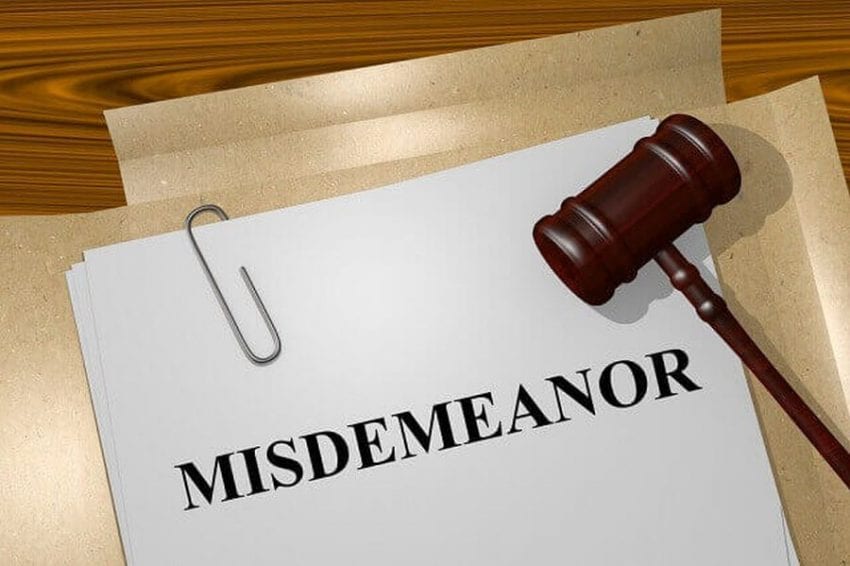When it comes to criminal convictions, most people understand the negative impact a felony has on an individual’s record. However, few people are aware of just how serious a misdemeanor conviction can be.
What is a Misdemeanor?
“A misdemeanor is a minor offense that the government punishes with fines, probation, community services, or up to a year in prison,” CriminalWatchDog.com explains. “While there are some differences between states on what exactly is considered a misdemeanor, the level of punishment is a good indication of whether or not that state considers the crime a misdemeanor or a felony.”
Common misdemeanor crimes in the United States include things like DUIs, possession of controlled substances, perjury, burglary and property theft, vandalism, unlawful possession of a weapon, violation of a restraining order, and resisting arrest.
While the consequences for a misdemeanor pale in comparison to that of a felony, they still come with numerous consequences that, in one way or another, will adversely impact your life.

The Direct Consequences
Let’s begin by exploring the direct consequences of a misdemeanor conviction. In other words, here’s a list of some of the penalties that can be brought down on you by the court of law:
- Fines. Every jurisdiction has different penalties and rules, but you can expect to pay somewhere between $500 and $2,500 for first-time misdemeanor convictions. Subsequent misdemeanor charges – like a second or third DUI – can result in even heftier fines.
- Jail time. While most first-time misdemeanors won’t require jail time, some do. And if you have multiple offenses on your record, it’s possible to spend as much as a year or two in jail. (More often than not, it’s just a few days or weeks.)
- Mandatory classes. With alcohol- and drug-related misdemeanor convictions, you can expect to take mandatory classes and/or attend rehabilitation programs.
The Indirect Consequences

The direct consequences of a misdemeanor conviction are finite. Once you’ve paid the fines, served the jail time, and/or attended the mandatory classes, you’re off the hook. But unfortunately, there are other consequences that will follow you around for years to come. These indirect consequences may include:
- Reputation. It’s hard to keep a misdemeanor conviction totally quiet. Your charges are public record and people will eventually find out. This can hurt what otherwise may be a very healthy and respected reputation.
- Ineligibility for public benefits. According to Attorneys.com, “The Public Housing Authority can deny you housing if there is compelling evidence you are or were involved with drug- or alcohol-related activities. Other public services affected by drug convictions include federally backed student loans, grants, work assistance, and welfare benefits.” If you rely on benefits like these to make ends meet, a misdemeanor can seriously jeopardize your future.
- Employment issues. In almost every hiring situation, the employer runs a background check. If they uncover a criminal charge or conviction, they have every right to drop you from consideration (and most will).

- Loss of licensure. If you’re already employed and work in a field that requires some sort of license to practice – such as law or medicine – your conviction could lead to a loss of licensure.
- Deportation. Illegal immigrants could face immediate deportation with a criminal conviction. Even immigrants with legal resident status can face deportation if charged with certain types of misdemeanors.
- Increased criminal activity. While not always the case, criminal charges often have a way of fostering further criminal activity. They create conditions by which offenders are desperate and willing to take matters into their own hands to reclaim freedoms or find new opportunities. The results can be catastrophic – often making bad situations even worse.
Fighting Your Criminal Charges
“All criminal convictions can affect your life in negative ways, no matter how seemingly minor,” Crain Lewis Brogdon, LLP mentions. “Signing a plea agreement is an admission of guilt, and your criminal record will be permanently marked. Your future is always worth fighting for, and it’s not usually a good idea to try going it alone.”
In other words, go ahead and hire a lawyer. While it’ll cost you some money, think of it as an investment. Whatever you pay to avoid a criminal conviction will benefit you exponentially in the long run. Stand up for your rights and don’t let a simple misdemeanor charge wreck your future.









